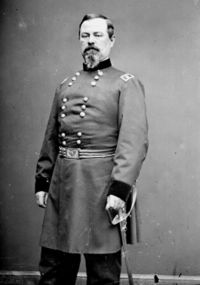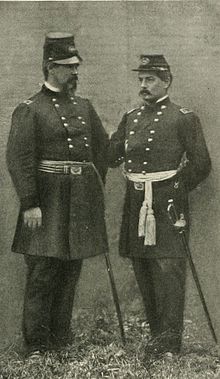- Irvin McDowell
-
Irvin McDowell 
Photo of Irvin McDowell taken during the American Civil WarBorn October 15, 1818
Columbus, OhioDied May 4, 1885 (aged 66)
San Francisco, CaliforniaPlace of burial San Francisco National Cemetery, Presidio of San Francisco Allegiance United States of America
UnionService/branch United States Army Years of service 1838–82 Rank  Major General
Major GeneralCommands held Army of Northeastern Virginia
I Corps, Army of the Potomac
III Corps, Army of Virginia
Department of the Pacific
Department of California
Department of the WestBattles/wars Mexican-American War
American Civil WarOther work Park Commissioner, San Francisco Irvin McDowell (October 15, 1818 – May 4, 1885)[1] was a career American army officer. He is best known for his defeat in the First Battle of Bull Run, the first large-scale battle of the American Civil War.
Contents
Early life
McDowell was born in Columbus, Ohio, son of Abram Irvin McDowell and Eliza Seldon McDowell.[2] He was a cousin-in-law of John Buford,[3] and his brother, John Adair McDowell, served as a colonel in the Union Army.[2] Irvin initially attended the College de Troyes in France before graduating from the United States Military Academy in 1838, where one of his classmates was P.G.T. Beauregard, his future adversary at First Bull Run. He was commissioned a second lieutenant and posted to the 1st U.S. Artillery. McDowell served as a tactics instructor at West Point, before becoming aide-de-camp to General John E. Wool during the Mexican-American War. He was brevetted captain at Buena Vista and served in the Adjutant General's department after the war. While in that department he was promoted to major on May 31, 1856.[3]
Between 1848 and 1861, McDowell generally served as a staff officer to higher-ranking military leaders, and developed experience in logistics and supply. He developed a close friendship with General Winfield Scott while serving on his staff. He also served under future Confederate general Joseph E. Johnston.[4]
Civil War
McDowell was promoted to brigadier general in the regular army on May 14, 1861, and given command of the Army of Northeastern Virginia, despite never having commanded troops in combat. The promotion was partly because of the influence of his mentor, Treasury Secretary Salmon P. Chase. Although McDowell knew that his troops were inexperienced and unready, and protested that he was a supply officer, not a field commander, pressure from the Washington politicians forced him to launch a premature offensive against Confederate forces in Northern Virginia. His strategy during the First Battle of Bull Run was imaginative but ambitiously complex, and his troops were not experienced enough to carry it out effectively, resulting in an embarrassing rout.
After the defeat at Bull Run, Maj. Gen. George B. McClellan was placed in command of the new Union Army defending Washington, the Army of the Potomac. McDowell commanded a division in the new army, but McClellan soon reorganized his command and McDowell was given I Corps the following spring. His corps stayed behind to defend Washington, and was eventually supposed to march to McClellan's support while the latter fought in the Peninsula Campaign; however, the nervous politicians who feared that General Thomas J. "Stonewall" Jackson's Valley Campaign would eventually attack Washington kept McDowell's 40,000 soldiers behind.
Eventually, the three independent commands of Generals McDowell, John C. Frémont, and Nathaniel P. Banks were combined into Maj. Gen. John Pope's Army of Virginia and McDowell led the III Corps of that army. Because of his actions at Cedar Mountain, McDowell was eventually brevetted major general in the regular army; however, he was blamed for the subsequent disaster at Second Bull Run. He escaped culpability by testifying against Maj. Gen. Fitz John Porter, whom Pope court-martialed for alleged insubordination in that battle. Despite his formal escape, McDowell spent the following two years in effective exile from the leadership of the Army.
Later service and postbellum career
In July 1864, McDowell was given command of the Department of the Pacific. He later commanded the Department of California, the Fourth Military District (the military government for Arkansas and Louisiana during Reconstruction), and the Department of the West. He was promoted to permanent major general in the regular army in 1872. In 1879, when a Board of Review commissioned by President Rutherford B. Hayes issued its report recommending a pardon for Fitz John Porter, it attributed much of the loss of the Second Battle of Bull Run to McDowell. In the report he was depicted as indecisive, uncommunicative, and inept, repeatedly failing to answer Porter's requests for information, failing to forward intelligence of Longstreet's positioning to Pope, and neglecting to take command of the left wing of the Union Army as was his duty under the Articles of War.
McDowell retired from the army in 1882 and served as Park Commissioner of San Francisco, California until his death in 1885. He is buried in San Francisco National Cemetery in the Presidio of San Francisco.
See also
Notes
- ^ Dupuy, p. 468; Eicher, p. 378.
- ^ a b Land of the Buckeye genealogy website
- ^ a b Eicher, pp. 105-6.
- ^ "Irvin McDowell", Ohio History Central; accesses 2011.08.30.
References
- Dupuy, Trevor N., Curt Johnson, and David L. Bongard. The Harper Encyclopedia of Military Biography. New York: HarperCollins, 1992. ISBN 978-0-06-270015-5.
- Eicher, John H., and David J. Eicher. Civil War High Commands. Stanford, CA: Stanford University Press, 2001. ISBN 0-8047-3641-3.
- Warner, Ezra J. Generals in Blue: Lives of the Union Commanders. Baton Rouge: Louisiana State University Press, 1964. ISBN 0-8071-0822-7.
Military offices Preceded by
noneCommander of the Army of Northeastern Virginia
May 27, 1861 – July 25, 1861Succeeded by
George B. McClellanPreceded by
noneCommander of the I Corps (Army of the Potomac)
March 13, 1862 – April 4, 1862Succeeded by
Irvin McDowellPreceded by
Irvin McDowellCommander of the III Corps (Army of Virginia)
June 26, 1862 – September 5, 1862Succeeded by
James B. RickettsCategories:- 1818 births
- 1885 deaths
- People from Columbus, Ohio
- American people of Scottish descent
- United States Army generals
- Union Army generals
- American military personnel of the Mexican–American War
- People of California in the American Civil War
- People of Ohio in the American Civil War
- United States Military Academy alumni
Wikimedia Foundation. 2010.

